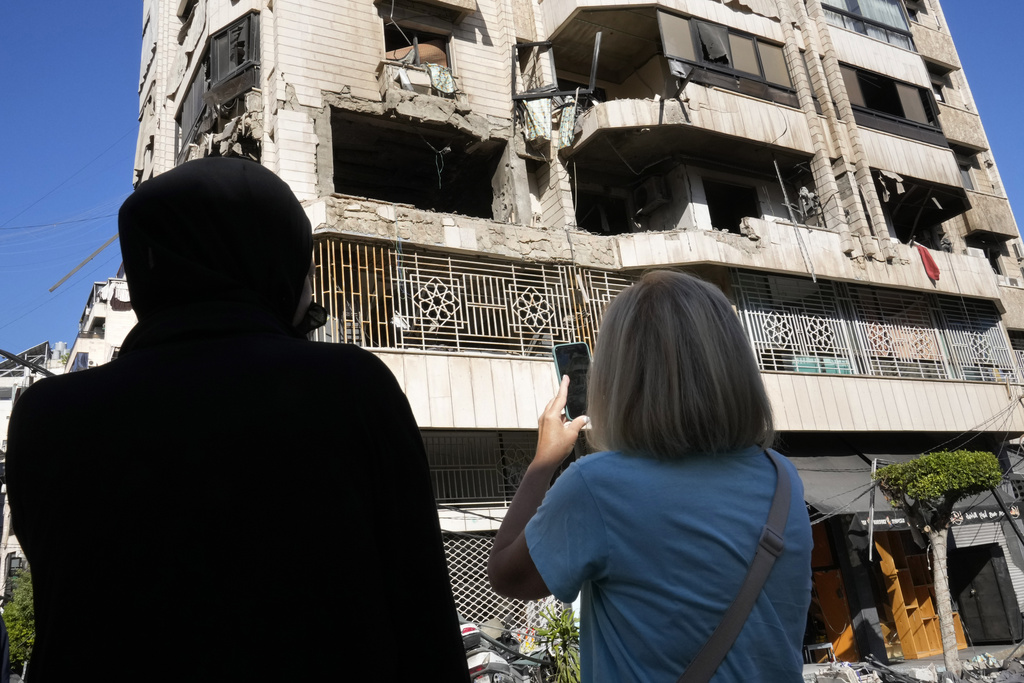“All I can say is that I’m alive. I’m not doing great. I’m not doing good. But I’m extremely grateful to be alive, especially when so many are not,” Vekasi said.
One thing that makes her feel a little better is the fellowship of the daily town meeting at the square.
“It’s incredible being able to meet in person,” said Vekasi, who was cut off by impassible roads for days. At Wednesday’s session more than 150 people gathered as local leaders stood atop a picnic table shouting updates.
In the midst of the devastating destruction left by the deadliest hurricane to hit the mainland U.S. since Katrinia, human connections are giving the survivors hope in western North Carolina. While government cargo planes brought food and water into the hardest-hit areas and rescue crews waded through creeks searching for survivors, those who made it through the storm, whose death toll has topped 180, were leaning on one another.
Martha Sullivan, also at the town meeting, was taking careful notes so she could share the information — roads reopened, progress in getting power restored, work on trying to get water flowing again — with others.
Sullivan, who has lived in Black Mountain for 43 years, said her children invited her to come to Charlotte after the storm, but she wants to stay in her community and look after her neighbors.
“I’m going to stay as long as I feel like I’m being useful,” Sullivan said.
In remote mountain areas, helicopters hoisted the stranded to safety while search crews moved toppled trees so they could look door to door for survivors. In some places, homes teetered on hillsides and washed-out riverbanks.
Nearly a week after the storm, more than 1.1 million customers still had no power in the Carolinas and Georgia, where Helene struck after barreling over Florida’s Gulf Coast as a Category 4 4 hurricane. Deaths have been reported in Florida, Georgia, Tennessee and Virginia, in addition to the Carolinas.
Robin Wynn lost power at her Asheville home early Friday and was able to grab a bag of canned goods and water before getting to a shelter despite water up to her knees.
“I didn’t know where I was going, didn’t know what was going to happen next. But I got out and I’m alive,” Wynn said on Wednesday.
Now that she’s back home, her neighbors have been watching out for one another. Plenty of people have come around to make sure everyone has a hot meal and water, she said.
Eric Williamson, who works at First Baptist Church in Hendersonville, normally makes home visits to members who can’t physically get to church. This week, he’s their lifeline, delivering food that meets dietary restrictions and tossing out food that had spoiled.
Beyond checking in on the essentials, he says it’s important to just socialize with folks in a moment like this to help them know they aren’t alone.
He has a handwritten list of everyone he needs to visit. “They don’t have telephone service, even if they have a landline, a lot of that isn’t working,” Williamson said. "So we're bringing them food and water, but also just bringing them a smile and a prayer with them just to give them comfort.”
Volunteers in Asheville gathered on Wednesday before going out to help find people who have been unreachable because of phone and internet outages. They took along boxes of drinking water and instructions to return in person with their results.
Even notifying relatives of people who died in the storm has been difficult.
“That has been our challenge, quite honestly, is no cell service, no way to reach out to next of kin,” said Avril Pinder, an official in Buncombe County where at least 61 people have died. “We have a confirmed body count, but we don’t have identifications on everyone or next-of-kin notifications.”







